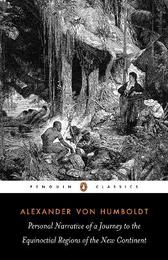
|
Personal Narrative of a Journey to the Equinoctial Regions of the New Continent
Paperback / softback
Main Details
Description
Alexander von Humboldt visited the tropics of the New World between 1799 and 1804. On his return he wrote this book, a classic work of travel that is also one of the great products of Enlightenment natural science. In his lifetime, Humboldt was described as "next to Napoleon, the most famous man in Europe". An admirer of the French Revolution, a Neptunist, an anti-slavist, a lover of Rousseau and Bernardin de Saint-Pierre, and a close friend of Goethe (whom he resembled), he was also a profound influence upon Darwin and the course of Victorian science, as well as upon the proponents of new world independence.
Author Biography
Alexander von Humboldt was born on the family estate at Tegel in Berlin in 1769. With his elder brother Wilhelm he was educated by tutors and then at Frankfurt, Goettingen and Hamburg Universities where he studied botany, literature, archaeology, electricity, mineralogy and the natural sciences. In 1790 he traveled abroad and published his first works in botanical and chemical journals. While at Jena he befriended Goethe. He worked in the Prussian Mining Administration until his mother died in 1796. A large inheritance enabled Humboldt to travel; after a few frustrations he was allowed by Charles IV of Spain to travel in the Spanish American colonies at his own expense, with his companion Aime Bonpland. After five years in the New World (1799-1804) Humboldt settled in Paris to begin publishing his encyclopaedic Relation historique du voyage aux regions equinoxiales du nouveau continent, finally completed in thirty volumes in 1834, where the Personal Narrative comprised volumes 28 to 30. Humboldt was not only a prominent figure in the Parisian scientific world but also Chamberlain to Friedrich Wilhelm III, and Councilor of State to Friedrich Wilhelm IV. In 1829 he traveled to Russia and Central Asia and published his account in French in 1843. In 1834 he began his comprehensive survey of creation, Kosmos, completed posthumously in 1862. He died in 1859, a bachelor, and was buried in the family vault at Tegel, honored as one of the great speculative scientific travelers of the nineteenth century. Jason Wilson was born in Mauritius in 1944, Was a lecturer at Kings College, London, and is currently Reader in Latin American Literature at University College, London. He has published Octavio Paz: A Study of his Poetics (1979), Octavio Paz (1986), An A-Z of Latin American Literature in English Translation (1989), the Traveler's Literary Companion to South and Central America (1993) and essays on W.H. Hudson, Charles Darwin, Julio Cortazar and Latin American poetry.
|